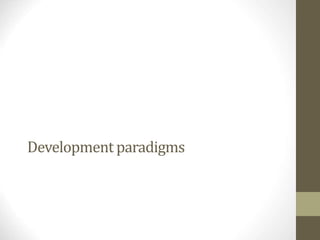
Development Paradigms
- 2. Development Paradigms Since World War II, three major paradigms or theories of development have emerged: 1. Modernization/dominant paradigm 2. Dependency paradigm 3. Alternative paradigm/another development/participatory
- 3. Modernization/Dominant Paradigm Origins in free trade and neo-classical economics. Development is viewed as a kind of social change in which new ideas are introduced in order to provide higher per capita incomes, GDP and higher living standards through more modern production methods, industrialization, trade liberalization, economic reforms.
- 4. Modernization/Dominant Paradigm Rationale for modernization theory: 1. History of industrialization and economic growth in West 2. Success of Marshall Plan in the rebuilding of post-war Europe 3. Adoption of centralized government and economic planning by former European colonies
- 5. Modernization/Dominant Paradigm 4. Cold War geopolitics and the spread of communist ideology 5. Evolutionary theory (Social Darwinism) 6. Influence of statistics and quantitative social sciences with the assumption that development was neutral, comparable and measurable.
- 6. Stages of Economic Growth • Walt Rostow (1964), The Stages of Economic Growth: A Non-Communist Manifesto • At different times in history, each society will pass through identifiable stages of development—from primitive, subsistence agriculture to modern, urban, industrial, consumer-driven economy • Economic stages are accompanied by development of political institutions, education and civil society • Pace of development will vary; at any point in history, societies will be at different stages, but development is inevitable
- 7. Modernization/Dominant Paradigm Key theorists: Daniel Lerner (1958), The Passing of the Traditional Society Everett Rogers (1962), Diffusion of Innovations Wilbur Schramm (1964), Mass Media and National Development
- 8. Critiques of Modernization • Unilinear, top-down, centralized • Favored spread of capitalism • Social and cultural norms viewed as a barrier to development • Negative impacts of industrialization • Lack of attention to media content
- 9. Critiques of Modernization Credibility of “trickle-down” approach Rising income inequality In Brazil in 1960s, 5% had 46% of national income, high unemployment rate vs. impressive growth rate, power concentration among elite (leading to inequality) Economic indicators do not give an adequate picture of the quality of life for individuals at the bottom
- 10. Critiques of Modernization Some religions with different value systems (e.g. Buddhism, Hinduism) were seen as incompatible with modern science, technology, ideology of progress Gender bias: Assumed patriarchal order, and a limited role for women in development Overlooked women’s unequal access to technical training, education, rights to land, etc.
- 11. Basic needs approach (1970s) • Foreshadowed human rights-based approach by placing emphasis on adequate food, clean water, shelter, education, security, transportation, and participation in decision-making • Life expectancy, infant mortality, and literacy are indicators of quality of life (Grant, 1978)
- 12. UN Human Development Index (HDI) • Origins in annual Development Reports of the United Nations Development Programme (UNDP) • Devised by Pakistani economist Mahbub ul Haq in 1990 "to shift the focus of development economics from national income accounting to people-centered policies.” Worked with group including Indian economist, philosopher and Nobel laureate Amartya Kumar Sen to create HDI which measured: • Life expectancy • Adult literacy rate • GDP per capita PPP
- 13. Dependency Paradigm • Theoretical basis in neo-Marxism, which views modernization as a continuation of colonialism and imperialism • The state of dependency is an external condition that obstructs national development objectives
- 14. Dependency Paradigm • Existing global economic relations, dominated by the industrialized North, contributes to underdevelopment • The state of dependency the result of flow of raw materials and resources from developing to developed countries
- 15. Dependency Paradigm • Looks ahead to critiques of globalization, interrelated world economy and digital divide • Developing country should disassociate itself from world market controlled by developed nations, and seek self-reliance, develop domestic industry and markets
- 16. Dependency Paradigm • Calls for a New World Economic Order and a New World Information and Communication Order (UNESCO) • Critique of cultural and media imperialism, e.g. Jeremy Tunstall, The Media are American
- 17. Critiques of Dependency Paradigm • Over-emphasis on external factors as barriers to development • Ignored social inequality, corruption and internal problems • Like modernization, focused on economic development
- 18. Alternative/Participatory Paradigm Emerged in mid-1970s in context of civil rights, peace, women’s and environmental movements in the West, and liberalization in developing countries. Development considered as a widely participatory process of social change Development includes not only economic development, but social, educational, and cultural development
- 19. Alternative/Participatory Paradigm Rejects universal, top-down, economic-based perspectives on development Each society, region and group should identify its own pathway to development Smaller, more targeted projects adapted to local needs, addressing many areas of human development
- 20. Alternative/Participatory Paradigm Development should: Alleviate poverty and satisfy basic human needs Promote popular participation at all levels Promote society’s self-reliance Promote equal access to resources Be sensitive to environmental concerns Consider local cultures, values and norms
- 21. Alternative/Participatory Paradigm Development needs are not only in the developing world, but in regions of the industrialized world Rejects top-down, one-way approaches to communication Supports small-scale, two-way, interactive participatory communication Use of indigenous knowledge, folk media, interpersonal channels
- 22. Critiques of Alternative Paradigm •Utopian ideology •Lack of central coordination •Participation and advocacy are Western concepts
